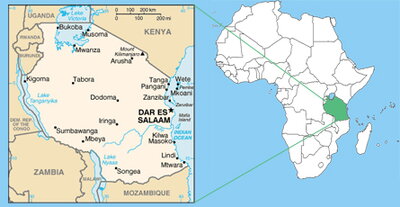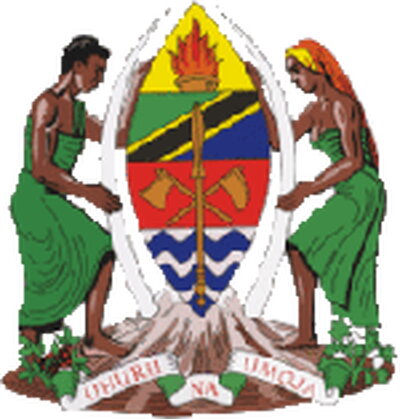

Region: Eastern Africa
Quick Facts:
- Population: 38.4 million
- Capital: Dodoma (official), Dar es Salaam (financial, also largest city)
- Area: 364,900 sq miles (slightly larger than twice the size of California)
- Major Languages: Swahili, English
- Life Expectancy: 46 years (men), 46 years (women)
- Literacy: 78.2%
- Monetary unit: 1 Tanzanian shilling (TZS)= 100 cents
- Exchange Rate: US $1= 1,255 TZS (March 17, 2007)
- Income (GDP) per capita: $653 (constant 2000 international $, WDI 2005)
- Urban population: 24% of total population
- Paved roads: 9% of total road surface
- Electric Power Consumption (per capita): 667 kWH
- Fixed line and mobile phone subscribers: 32 per 1,000 people (2003)
- Internet Users: 9 per 1,000 people
- Internet Domain: .tz
- Country Code: +255
- Time Difference: UTC +3 (9 hours ahead of Illinois during Standard Time)
- Climate: Tropical. Hottest month is January (78-84F ), coldest month July (68-74F)
- Type of Government: Republic
- President: Jakaya Kikwete
Historical Background:
A German colony from the 1880s until 1919, the area of mainland Tanzania (called Tanganyika) became a British Mandate from 1919 to 1961. It served as a military outpost during WWII and provided financial help as well as munitions. Julius Nyerere became Minister of British-administered Tanganyika in 1960 and continued as Prime Minister when Tanganyika became independent in 1961.
Tanganyika and the island of Zanzibar, which had become independent in 1963, merged to form the nation of Tanzania on April 26, 1964. Nyerere introduced policies of African socialism which emphasized justice and equality. These programs concentrated on distributional objectives and social services over economic growth.
One-party rule came to an end in 1995 with the first democratic elections held in the country since the 1970s. Zanzibar's semi-autonomous status and popular opposition have led to two contentious elections since 1995, which the ruling party won despite international observers' claims of voting irregularities.
Socio-political Background:
Politics of Tanzania takes place in a framework of a federal presidential democratic republic, whereby the President of Tanzania is both head of state and head of government, and of a pluriform multi-party system. Executive power is exercised by the government. Legislative power is vested in both the government and parliament.
Tanzania is a country of significant ethnic diversity, with more than 120 ethnic groups, each of which speaks its own language. Tanzania is also a religiously divided society, with Muslims accounting for 35 percent of the population and Christians comprising another 30 percent. The common use of the Swahili language as well as Nyerere’s emphasis on national unity have probably contributed to the country’s cohesiveness and stability.
HIV/AIDS is prevalent in almost nine percent of Tanzania’s population. Diarrhea, malaria, and typhoid are some high risk infectious diseases found there.
Economy:
Tanzania is one of the poorest countries in the world. The economy depends heavily on agriculture, which accounts for almost half of GDP, provides 85 percent of exports, and employs 80 percent of the work force. Topography and climatic conditions, however, limit cultivated crops to only four percent of the land area. Industry traditionally featured the processing of agricultural products and light consumer goods. The World Bank, the International Monetary Fund, and bilateral donors have provided funds to rehabilitate Tanzania's out-of-date economic infrastructure and to alleviate poverty.
Long-term growth through 2005 featured a pickup in industrial production and a substantial increase in output of minerals, led by gold. Recent banking reforms have helped increase private-sector growth and investment. Continued donor assistance and solid macroeconomic policies supported real GDP growth of nearly 6% in 2006.
Significant measures have been taken to liberalize the Tanzanian economy along market lines and encourage both foreign and domestic private investment. Beginning in 1986, the Government of Tanzania embarked on an adjustment program to dismantle socialist economic controls and encourage more active participation of the private sector in the economy. The program included a comprehensive package of policies which reduced the budget deficit and improved monetary control, substantially depreciated the overvalued exchange rate, liberalized the trade regime, removed most price controls, eased restrictions on the marketing of food crops, freed interest rates, and initiated a restructuring of the financial sector. GDP per capita of Tanzania grew 59% in the 1990s.
Cash crops, including coffee, tea, cotton, cashews, sisal, cloves, and pyrethrum account for the vast majority of export earnings. The volume of all major crops--both cash and goods, which have been marketed through official channels--have increased over the past few years, but large amounts of produce never reach the market. Poor pricing and unreliable cash flow to farmers continue to frustrate the agricultural sector.
Accounting for only about 10% of GDP, Tanzania's industrial sector is one of the smallest in Africa. The main industrial activities include producing raw materials, import substitutes, and processed agricultural products. Foreign exchange shortages and mismanagement continue to deprive factories of much-needed spare parts and have reduced factory capacity to less than 30%.
Despite Tanzania's past record of political stability, an unattractive investment climate has discouraged foreign investment. Government steps to improve that climate include redrawing tax codes, floating the exchange rate, licensing foreign banks, and creating an investment promotion center to cut red tape. In terms of mineral resources and the largely untapped tourism sector, Tanzania could become a viable and attractive market for U.S. goods and services.
Trade Information:
- Exports: $1.831 billion (2006 est.)
- Export Goods: Gold, coffee, cashew nuts, manufactures, cotton
- Main Export Partners (2005): China (10.5%), Canada (8.9%), India (7.5%)
- Imports: $3.18 billion (2006 est.)
- Import Goods: Consumer goods, machinery and transportation equipment, industrial raw
- materials, crude oil
- Main Import Partners (2005): South Africa (12.7%), China (9.2%), Kenya (7.9%)
Resources for Businesses:
Embassy of Tanzania, Washington DC
2139 R Street, NW
Washington, DC 20008
Telephone: +1 (202) 939 6125/7 ; +1 (202) 884 1080
Fax: +1 (202) 797 7408
Email: ubalozi@tanzaniaembassy-us.org

Investment and Trade Guide
Information from the Tanzanian Embassy
Ministry of Industries and Trade
Tanzania Chamber of Commerce, Industry & Agriculture (TCCIA)
Second Floor, Twiga House, Samora Avenue
P.O. Box 9713
Dar es Salaam, Tanzania
Tel: (255) 22 2119436; (255) 22 2128136
Fax: (255) 22 2119437
Email: info@tccia.com
The Board of External Trade (BET)
The Director General
Board of External Trade
Nyerere Grounds
Kilwa Road
P.O. Box 5402
Dar es Salaam, Tanzania
Tel: (255) 22 2851706
Fax: (255) 22 2851700
Email: betis@intafrica.com
Tanzania Bureau of Standards (TBS)
The Director General
Tanzania Bureau of Standards
P.O. Box 9524
Dar es Salaam, Tanzania
Tel: (255) 22 2450206; (255) 22 2450298
Fax: (255) 22 2450959
Email: standards@twiga.com
Last updated on 09/23/2009